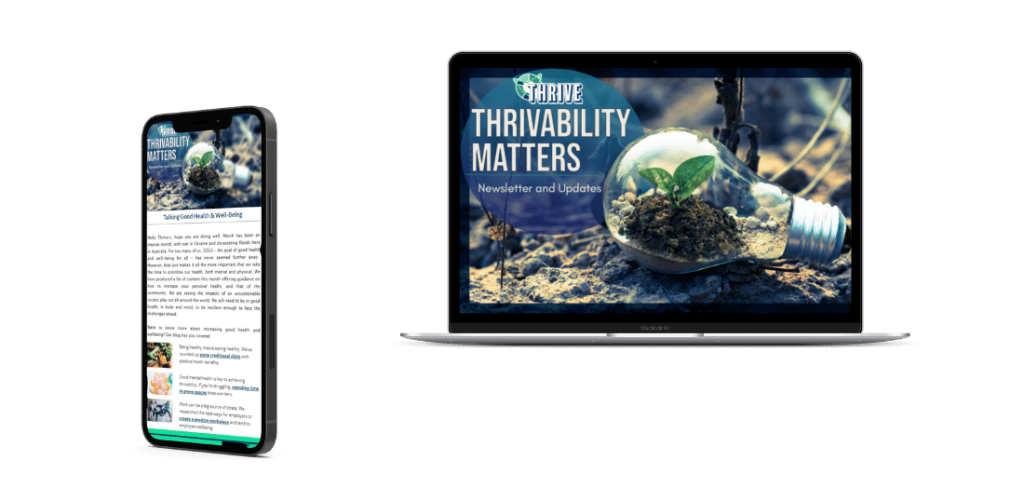The THRIVE project would like to extend our warmest gratitude to John Trinder, Laura Puttkamer, and Jennifer Luke for giving guest presentations at our September Thrivability Matters webinar. The theme of this webinar was the United Nations Sustainability Development Goal, SDG11 (Sustainable Cities and Communities).
About our speakers
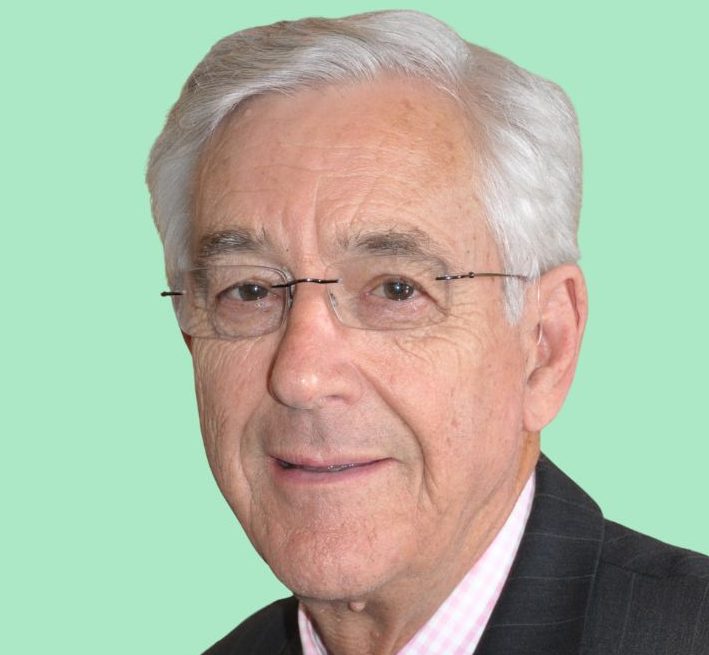
John Trinder is an Emeritus Professor at the University of New South Wales School of Civil and Environmental Engineering. He has spent over 50 years in teaching and research on a range of topics including photogrammetry, remote sensing, and spatial sciences. With numerous awards and scientific papers to his name, he has worked on using remote sensing to assess the sustainability of environments and manage land and water resources.
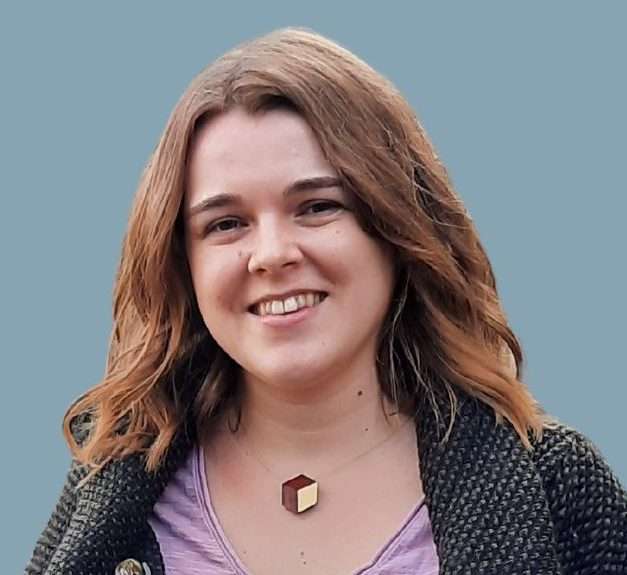
Laura Puttkamer is a journalist and writer focusing on stories about urban development and planning. Her interests cover the implementation of SDG11, the New Urban Agenda, participatory urban planning, public space, and the intersection of cities and climate change. She blogs at Parcitypatory and writes regularly for magazines such as Urbanet.
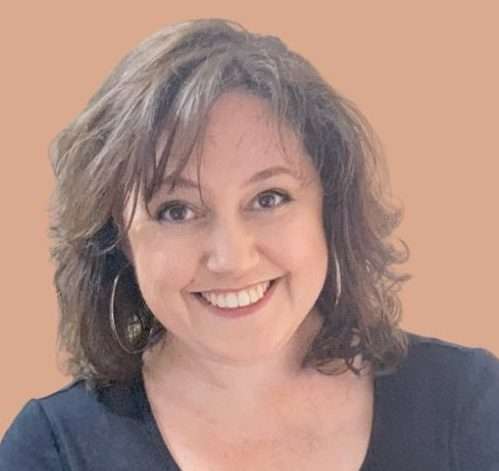
Dr. Jennifer Luke is a Research Fellow (Wellbeing & Employability) within the Drought Resilience Adoption & Innovation Hub based at USQ and also the Queensland Division President of the Career Development Association of Australia (CDAA). She has a strong research, practice, and advocacy focus on many areas including career and workforce development across the lifespan, inter-generational mentorship, employability & wellbeing for all ages, industry skills retention & decent/meaningful work – all of which link in with the UN’s Sustainable Development Goals. Our recent Thrivability Matters Podcast with Jennifer on “Decent Work for All” can be found here.
Summary of the webinar
Emeritus Professor John Trinder on the topic of Remote Sensing for Urban Sustainbility
Emeritus Professor John Trinder started his presentation by discussing what sustainable cities are and the need for sustainable urban systems. He then brings up the ‘benefits of exposure to green spaces’ as these are necessary in creating sustainable urban plans. The green spaces help in reducing blood pressure, meaning it has a calming effect on us which helps with psychological restoration. So how does remote sensing fit in this picture?
According to John, satellites, aircraft’s or drones that have active scanner systems are necessary in gathering data. This remote sensing data then grants us access to seeing how land and urban development takes place from above. For example, ‘Landsat’ is the longest continuous series of earth observation satellites which has granted us the ability to monitor changes in land use over a period of more than 30 years. He then moves on to show us research examples from Wuhan and Sydney with approximately 30 years of Landsat scenes. For example, local urban land development in Sydney has consequently led to large travel times. This sprawl takes place due to the sizes of building and vegetation, but also poorly planned land development.
“Ecosystem services are those provided by the natural environment and properly functioning ecosystems, for the benefits of humans”. Examples of services that humans are dependent on are water treatment, food production, gas regulation, pollination, and water supply. According to John, “human well-being is dependent on interactions between built, social, human and natural capital”. John concludes by stating about the “need to raise awareness of interdependence of ecosystems and human well-being and biodiversity”. Decision makers need to assess the impacts of development on ES. His final thoughts on this subject can be found from here.
Laura Puttkamer on the topic of How to Create Sustainable Neighbourhoods
Laura Puttkamer started her presentation by discussing from a journalistic perspective how climate change is changing the landscape around us. She uses London as an example, and shows how the media often portrays cities as victims. Although, they are also villains as they produce 75% of global CO2 emissions. Other issues are urban heat effect, and how the poorest are most affected. So how can we create sustainable neighbourhoods?
The new urban agenda, Paris agreement, SDG13, local agenda 2030, and smart cities are some of the visionary frameworks that are designed to help us develop sustainable cities. According to Laura, individual corporations can help in funding and implementing solutions towards tackling climate change. She then discusses problems and solutions from Mexico City to Copenhagen and their work towards creating sustainable spaces. She also mentions how different media companies portray climate change in different ways. For example, the Guardian uses concepts such as climate crisis instead of climate change. This is in an effort to draw attention towards an important topic and gain visibility. In her conclusion she discusses the elements of a sustainable neighbourhood such as sponge cities, as well as giving us some recommendations on how to create them. The summary of her presentation can be found here.
Dr. Jennifer Luke on the topic of Inclusive Communities – Building Meaningfulness and Adaption in Changing Times
Dr Jennifer Luke discussed in her presentation how to make cities and human settlements inclusive, especially in terms of career and workforce development. The four focus points in career development are know yourself, explore options, focus, and take action. Thereafter, she focuses on discussing the exploring options focus point, which has new opportunities now and, in the future.
In her second part of the presentation Laura discusses different employment sectors. As well as providing examples of types of jobs in each of the sectors. The sectors are ‘safe and affordable housing’, ‘affordable and sustainable transport systems’, inclusive and sustainable urbanization’, ‘protect the world’s cultural and natural heritage’, ‘reduce the adverse effects of natural disasters’, ‘reduce the environmental impacts of cities’, ‘provide access to safe and inclusive green and public access’, ‘strong national and regional development’, ‘implement policies for inclusion’, ‘resource efficiency and disaster risk education’, and ‘support least developed countries in sustainable and resilient building’. Jennifer concludes by stating that as the global population keeps increasing we need to make cities more sustainable. Cities where we can all survive and prosper. For this to happen, we need intelligent urban planning that creates safe, affordable, and resilient cities. Jennifer’s full presentation can be seen here.
CONCLUSION
In summary, emeritus Professor John Trinder’s presentation gives us a small glimpse into how remote sensing allows us to study the land development use. As well as why ecosystem services are important when creating urban areas. Laura’s presentation helps us understand better what sustainable neighbourhoods are and what we can do to create them. As well as how the media can portray climate change. Jennifer’s presentation allows us to strive for career development within the sustainability sector as there are many new jobs in the sustainable communities sector.
If you missed out on the presentations or the live Q&A session, you could view the recording on our YouTube channel once it’s released. Rest of the unanswered Q&As can be found by pressing the links below.
Make sure to register for the October webinar on SDG1 & SDG2 – No Poverty & Zero Hunger
Thanks, and do keep on thriving!
SUBSCRIBE TO OUR NEWSLETTER
Smart Communities Task Team
The THRIVE Project has its very own Smart Communities task team built of experts in their own fields, to help in creating awareness and finding solutions to create sustainable smart communities.
GOT A QUESTION ON THIS TOPIC?
Ask an Expert
COMING UP NEXT MONTH
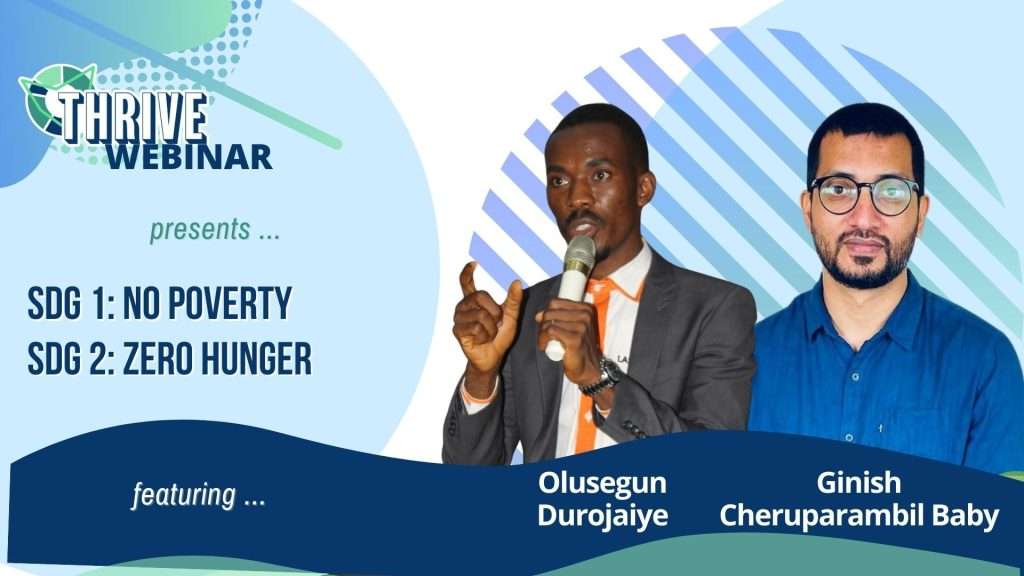
Next month, we’re focusing on SDG1 & SDG2 – No Poverty & Zero Hunger, two social issues that affect most societies around the world. On that front, we are thrilled to have two experts – Olusegun Durojaiye and THRIVE Projects very own expert Ginish – talk about how these social issues can be dealt with. Register below and save the date!
JOIN OUR UPCOMING WEBINAR
